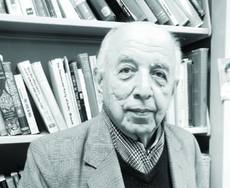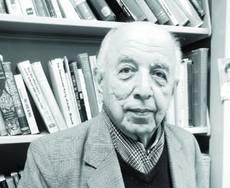
(nhi nguyen)
Young: Tell me about your background. Where are you from?
Adenwalla: Well, okay, I was born in a place called Punaj in India. I did most of my schooling in Bombay, at a very good school called New Era. I did my undergraduate university training at the University of Bombay, and my subject was English literature. After graduating with a B.A., I was given a teaching fellowship at Wilson College Bombay University, and I taught there for a year, but I never went on to complete my Master’s in English Literature, and was satisfied with my B.A. Honors degree. In India we have honors degrees just as they do in England, and like most of my family, I intended to try to go to England. I applied to the University of Cambridge and to St. John’s College, and I got in touch with the Master of St. John’s College. To cut a long story short, since it was the veteran’s rush after World War II in England also, they wanted my B.A. honor results in March, of 1948 – or was it ’49? I can’t remember. I told them that I would be sitting for my exams in March, and that the results weren’t going to be out until June. The Master of St. John’s wrote back to me, saying he was very sorry and that they’d be very happy for me to apply for the following year, but they could not hold a place for me unless I could let them know [my exam scores] in March. Well, I passed my English honors exams, there was no problem there, but Cambridge would not hold my position, and that sort of irritated me. Just by chance, my father met one of my close friends the very day I got the letter from St. John’s saying they wouldn’t hold a place, and this friend of mine was going to the University of California at Berkeley. He said to my father, “Why do you Adenwallas all go to England the whole time? The future lies in the United States.” So my father came home and told me about his meeting, and I’m not a very impulsive person, but certainly that day I was. So, suddenly in the flash of a moment I said okay, I’ll apply to the United States, so that’s what led to applying here.
Young: How did you come to Lawrence?
Adenwalla: Well, my first teaching position was at a superb liberal arts college in Ohio called Kenyon College. I was a visiting instructor, filling in for the chair of the government department. I spent this period at Kenyon College and thought it was tremendous; I liked it very much. When the time came to leave Kenyon, I started to apply elsewhere, and one of the places I applied was Lawrence College. I had first heard the name of Lawrence College when I was a graduate student, and I had read a short squib in Time Magazine that Harvard had gone to Lawrence College to pick its president, which of course was Nathan Pusey. In my mind I said, this place ought to be rather good, if Harvard went there to pick its president. So Lawrence responded to my application, and president Douglas Knight interviewed me and told me that the position would be mine if a Carnegie grant to create this position came through. This was in March 1958. Two or three weeks later, I got a call saying that the Carnegie grant still had not come through, and that I should be free to look for another position. It was one of the most depressing days of my life. At a conference in Michigan, a friend of mine put me in touch with the chair of the department at the University of Missouri. They offered me the position, and I took it. Doug Knight told me to keep in touch with him, however, because he was sure that the grant was going to come through, and if it did, that I would get the position. I wasn’t sure if it was just one of those “Dear John” letters letting me down gently, but I thought he was sincere. A little before spring break, in March of 1959, I was in the shower, and my wife knocked on the door, and in a tremulous voice said, “quick, there’s a long distance call for you from president Knight of Lawrence University.” So, I wrapped a towel around myself, and dripping wet I came to the telephone, and sure enough, it was Doug Knight saying, “Hello, Minoo, the Carnegie grant is here, we’d very much like for you to come for an interview, can you make it?” I didn’t know what I was going to do, but I said okay. We went through a full day’s interview, and then that very evening Doug Knight drove me back to the airport in Oshkosh and offered me the position, and I wondered why the devil I’d been put through six interviews about which he knew nothing when he went ahead and made the offer to me, but I didn’t argue with him. In March of 1959 I accepted the offer to come to Lawrence. It was one of the most difficult decisions I’ve made in my professional life, but I’ve survived here at Lawrence, and I’m still sitting here talking to you in 2010.
Young: What has been your favorite class at Lawrence to teach?
Adenwalla: Good heavens! I’ve enjoyed teaching so many of the courses I have. Of course, Constitutional Law and Civil Liberties, which I still teach once every academic year. My political philosophy seminars I’ve enjoyed a lot. I used to teach a course on Indian politics which I also enjoyed a great deal, and the introductory political science course was quite enjoyable also. I’m trying to think of a course I didn’t enjoy… freshman studies when they introduced music into it, because I thought it was an insult to the course to have someone like me, completely ignorant about music, pretending that I’d picked up enough to teach it. I speak only for myself. Many of my colleagues thought that introducing music into it really completed the course. I felt very differently. All the other fields where you could absorb and read the information, that was fine, but I draw the line at music.
Young: Besides politics and your research, do you have other hobbies?
Adenwalla: Well, I occasionally write for a publication that deals with politics called “Freedom First,” and I also wrote for a monthly in Bangladesh called The Executive Times that was started by a family with a student at Lawrence. When I feel like it, I send them an article or so. Do I have any special hobbies? No, not really. Yes, reading, and teaching my class every year, but neither are new hobbies. My elder daughter and her family live in Pennsylvania and I go there twice a year; I enjoy that quite a bit. I have two grandchildren there that are grown. My younger daughter and her husband live in Appleton. They have one daughter, Katie, who is 17 years old. I was exploited mercilessly when she was young to babysit, and all this rubbish about grandparents loving to be with their grandchildren certainly doesn’t apply to me. She was a cranky and difficult child, I did not enjoy my sessions of babysitting with her. I enjoy spending time with her much more now, since she’s an excellent student and conversationalist, that gives me much more pleasure.

(nhi nguyen)
